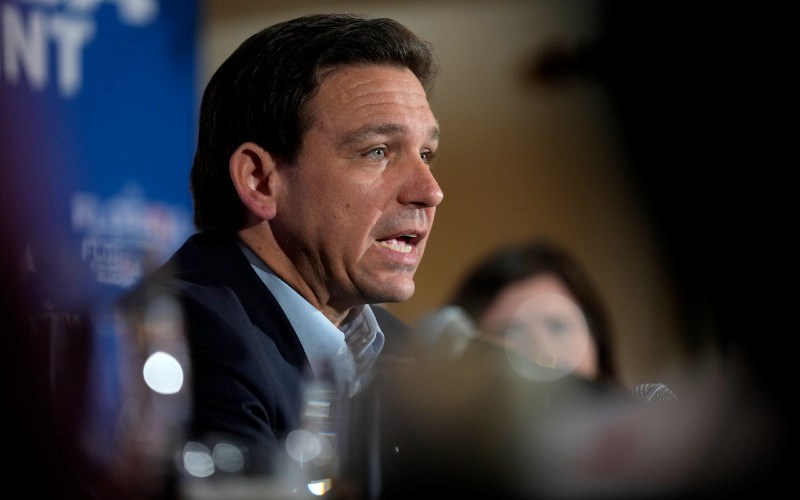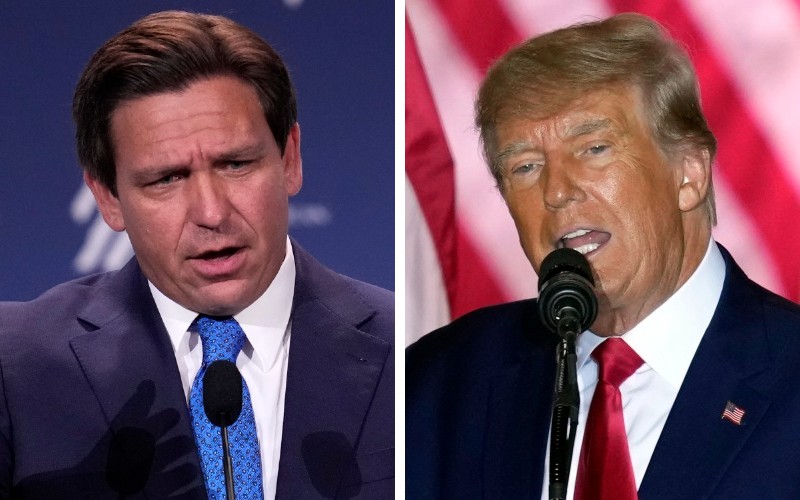'He doesn't have Trump's baggage'Chad Groening (AFN) Governor Ron DeSantis will reportedly make the official announcement on Thursday from his hometown of Dunedin, Florida, that he will enter the 2024 presidential race, setting up what could be a contentious primary battle with former President Donald Trump. During a recent phone call with donors, DeSantis said he is the only GOP candidate who can win both the Republican primary and the general election. Robert Knight, a conservative columnist and political analyst, feels strongly that DeSantis does have an easier path than Trump to the White House. 
"A lot of people say they like Donald Trump but they're afraid he won't attract the middle-of the-road support that will win the general election," Knight tells AFN. "But I don't hear that [being] said about Ron DeSantis, that somehow if he gets the nomination he won't be able to attract the people who were put off by Trump's personal faux pas." Still, the columnist believes either of the two can win in November. "I've heard people say that they don't think Trump can overcome his personal flaws – and others who say … he's the only guy strong enough to go right up against the lock-step media and the Deep State and win," Knight shares. "I happen to think either man could do it. But I think DeSantis actually has an easier path to do it, given that he doesn't have Trump's baggage." Ever since he announced his own candidacy late last year, Trump has recognized DeSantis is his biggest potential rival for the GOP nomination. |
That day will be "soon," he vowed to American Family Radio listeners during a live interview from Orlando, a precursor of sorts to his address Monday night at the National Religious Broadcasters annual convention.
Religious liberty: A bedrock freedom
Religious liberty, the governor stated, is something America's Founding Fathers knew was fundamental to a free society. But as the governor noted, a lot has changed since America's founding.
"Religious liberty has probably never been more threatened – and so it requires people like me in these positions to stand forthrightly in defense of it," he said. In DeSantis' case, a forthright defense meant taking on the Florida High School Athletic Association, the state's governing body of high school sports – which he said was basically acting as a private body.
He disagreed with the FHSAA's position on prayer over a school's public address system before football games and thought the group dragged its feet in implementing the law he signed in 2021 that banned transgender males from competing on girls teams.
"We have basically reorganized that board so that it is subject to gubernatorial appointments, and we're going to make sure that it's doing what's in the best interest of Florida," DeSantis said. Now, the FHSAA's ruling 16-member board includes three representatives appointed by the state's commissioner of education.
DeSantis has also expanded conscience rights for doctors and medical personnel.
"We think it's really important that if you're training to be a doctor that you do not have to do things like perform abortions or do things that violate your conscience. So, we put in really robust protections for that as well as overall free speech for physicians," he said.
DeSantis also discussed the COVID-19 pandemic, which he pointed out was hard on doctors who disagreed with certain government positions.
"If you dissented from the narrative, sometimes you could get run out of the profession. But it was the COVID dissenters who were really right about all these things from lockdowns to mandates to masks," DeSantis said.
"There are some significant protections for our physicians, and I think Florida's going to be a haven for physicians who want to flee places like California and be able to practice in freedom here."
Enlisting help from faith-based groups
Florida's expanding role for churches in the care of citizens and neighbors is another example of DeSantis' strong stance on religious liberty, he said.
"Hope Florida – A Pathway to Prosperity" – a program led by his wife, Casey DeSantis – aims to help struggling Floridians find economic self-sufficiency. Hope Florida expands its possibilities by enlisting private-sector help, the governor said.
While the program is operated by the state's Department of Children and Families, it leans heavily on faith-based institutions and nonprofit organizations. After an assessment a plan is developed, clients are connected with willing partners who can assist children aging out of foster care; pregnant mothers, some with substance abuse problems; or just families who need some help.
"We've transformed our welfare system into more of an opportunity system where we enlist private groups, businesses, and churches as part of this care portal. So that if a young mom needs something, she goes through the portal, and you could have your local Baptist church show up and provide support," DeSantis explained to show host Jenna Ellis.
The program has been especially helpful for single moms who lack the necessary support structure to raise a child.
"We're not just pro-life when the baby's in the womb – we're pro-life when the baby is born," DeSantis said. "We have transformed our welfare system into more of an opportunity system. We have embraced our churches and synagogues in ways that other states have not been willing to do."
According to the governor, upwards of 5,000 people have been served by Hope Florida in the past year – and virtually none have gone back for government assistance.
"Maybe they need a mattress or a crib for their baby. What happens when you [provide] that is a connection is made. The government ends up just getting out of the way because [when] somebody, [maybe] a church … takes interest in one of these mothers, they're going to be so much better about getting them on their feet than somebody who's just working in a government bureau," DeSantis said.
Hope Florida has helped clients find access to housing and food and has helped with long-term goals like employment and education.
It began as a Department of Children and Families pilot project in six counties in August 2020 and served more than 10,000 Floridians in the first year.
"Having the privilege of traveling the state, our team saw an immense value in bringing together public and private groups to collaborate and communicate with and on behalf of Floridians," Casey DeSantis told ChronicleOnline.com last spring. "Florida's communities are full of organizations and businesses that want to lift up their neighbors in need, and this program has given them the outlet to do so."
Ron DeSantis expanded the initiative with more services available for more people. The beefed-up program relaunched in September of 2021 and had helped more than 25,000 clients in its first seven months.
The program also provides resources for clients with mental health and substance abuse needs.
"We're really focusing on a lot of vulnerable single moms. Don't just go to a government office and get a TANF grant or a check. We know that's not going to do the trick. There has to be more than that," DeSantis said.







